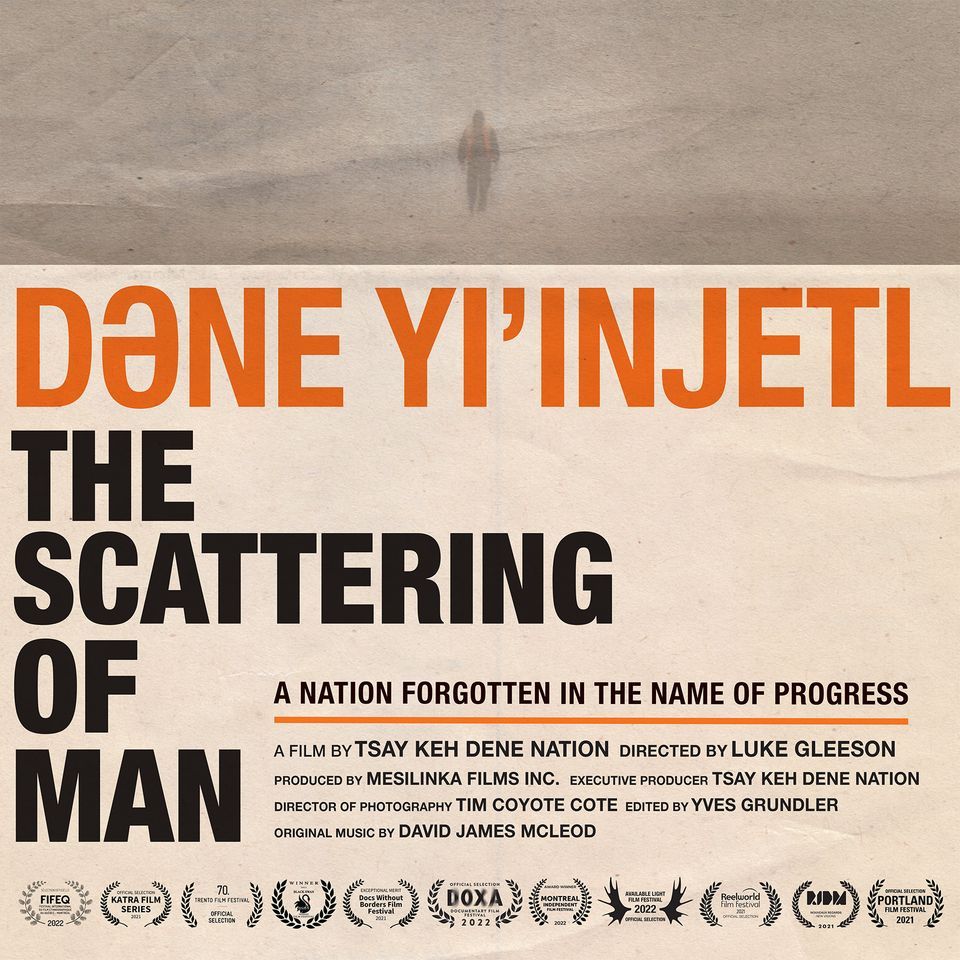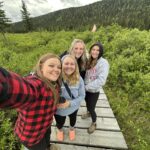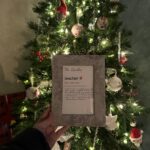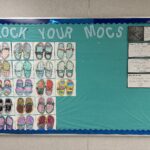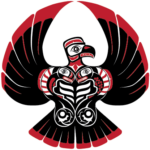Please be aware that this blog post could be triggering as it encompasses discussions on residential schools, colonization, death and truth and reconciliation.
Well good morning, good afternoon, good evening, whenever you are reading this I hope you are well. Please, brace yourself as this will be a long post. Condensing my emotions, reflections, and thoughts on this film and the conversations that took place after will not do the justice it deserves.
For today’s blog post, I am going to be talking about the film above – The Scattering of Man. This film is by the Tsay Keh Dene Nation which is located in Northern B.C. To give some context, this film is the story of the devastating impacts that the W.A.C. Bennett Damn had on the Tsay Keh Dene Nation. In the creation of the dam, the Band was not consulted about the project, there were no conversations on how they planned to help relocate the community and all that it encompassed (The Narwhal). As a result, the Nation was forced to relocate quickly and frequently due to the content flooding of their area. B.C. hydro did not harvest the timber that they tore down for the project, leaving the Nation to collect it out of the water (reservoir) and burn what is left to prevent damage to their property and belongings. There were dead animals rising in the water, animals chased off and land resources torn apart. There was promises made to resurface the grave that went under with the village… a broken promise. The village that belonged to the Tsey Keh Dene Nation was completely submerged under the water.
There was no compensation for the flood, there were broken promises, rising health hazards, etc. “We are paying with our health for what they have done to us, that we didn’t give them permission” – Documentary.
Some important details from the film that I noticed:
- There were many shots of the beautiful, peaceful and bare land to symbolize what is was like before the project went underway.
- There were many scenes that were of big machines tearing trees down, empty land, destroyed buildings, etc. to symbolize the destructive impact this project and B.C. hydro had on the Tsay Keh Dene Nation.
- Many face shots of those apart of the Tsay Keh Dene Nation who were interviewed throughout the film. To me, this symbolized the reality and impact of this action. These are real people and they deserve to be treated as so.
Some more quotes that I heard from various interviews throughout the film that made me understand and feel the emotions that this tragedy put the Tsay Keh Dene Nation through:
- “nothing done for us, never come see our situations, never speak up, the government does nothing”
- “I am speaking now for my children and great-grandchildren”
- “It is very hard for me to explain the devastation we felt back then”
- “You think anyone cared? no one cared.”
- “Nothing there for them except drinking, drinking, drinking. You just stay in your pen and that’s it.”
- “Never thought of us as human beings. I went away on a Friday and came home on a Sunday and my parents drown. I wish whoever did this to us could see what it has brought us to”
- “I honestly feel like B.C. hydro does not give a crap about us”
- “They don’t pay for our flood”
- “We are simply just trying to survive”
- “There is no future if you don’t have healthy people or land.”
Some quotes that gave me hope and inspired me to be apart of the action for change.
- “We would love to see everyone coexist, we should never judge based on the colour of skin or anything. We need to be kind and love each other.” – This is from a speaker at the screening named Kirk. This idea of forgiveness, kindness, and inclusivity, coming from a member of the Tsay Keh Dene Nation, after what they have been through provides me with so much hope.
- “Elders need to speak to young leaders, they’re ready to tell the world, they’re reading to fight and say NOW IS THE TIME TO LISTEN TO US!” – This is from the Chief at the screening.
- “There will always be the brave” – Documentary
- “Our purpose to be here with our children is to teach them, teaching young people our way of life.” – Documentary
- “We are keepers of the land, we take from it but we also give back to it.” – Documentary.
- “It is important to live like we use to, get back to the land.” – Documentary
The fact, that this Nation has faced this devastating tragedy and is still willing to live off the land, relocate, build its community again, tell its story, pass down knowledge, and stand up, shows the perseverance and strength the community and its people have. I am struggling to put into words how influenced and moved I am by the fact that this Nation did not and will not give in or give up.
After the film, we were fortunate to sit in on a question and answer chat with the director, a few members of the Tsay Keh Dene Nation and a residential school survivor. Before I share my biggest take away, I would like to just share some of the things I heard from all speakers.
- “I went to residential school, I have seen it over and over, this.. this is systemic murder” – Residential School Survivor
- “It is important to know that this fight is not over, not by a long shot, this is only the beginning” – Residential School Survivor
- “We are not waiting for the government to recognize us were trying to build our own nation as we already were” – Luke Gleeson
- “I have been disabled my whole life because I was born with the disability of being First Nations”
Now, it is ok if this takes some time to read, it definitely took some time to process and write about on my end. This is the reality that we live in and unfortunately, due to the lack of transparency, many of the events that have happened have gone unnoticed. Colonization has set a tone for Indigenous people, a tone that we as settlers can do what we want, when, where and how we want to without repercussions. But we can be a part of the change, we can surface this event with permission, and we can bring them to light to inform those who do not know. I recently watched a film about the missing and murdered Indigenous women called “Finding dawn” and Welsh says something that I think can be applied here: “By raising awareness and being informed we can take better care of our living.”
My biggest takeaway from the Q&A session was when Luke Gleeson answered a question with this “I am tired of reconciliation… Let’s see the action. I do not like reconciliation because I am tired of hearing about it and not seeing it.” This was a moment where I realized as a future educator, I can be a part of the action. Resulting in many questions I have for myself,
- How can I as a future educator be sure that I am apart of the actions toward reconciliation?
- How can I inform and teach my students about this concept?
- Lastly, what now?
I think I ask myself what now because I want too dive into action, but ultimately I have no idea where to start. So, my what now is informing and educating myself. I want to be apart of unsettling conversations that are acting towards change, I want to be apart of a much bigger role than I am now. Being honest, although these events give me a heavy heart and throughout the educating, the conversations, the informing, I feel my heart getting heavier, I am excited for feeling with Indigenous people do SEE the reconciliation.
I know this was heavy and I thank you so much for staying and reading the whole thing. I hope that there was something in here that resonated with you, stood out to you, and that you can take away with you. This film was an important factor in my thoughts and opinions on reconciliation and I highly recommend it. As important as it was, I need to acknowledge the impact that listening and reflecting to live conversations and speeches from those who have lived it and those who are affected by it has. I encourage you to take advantage of every opportunity to educate yourself.
I would like to close with a quote that I heard in the film that I feel is just extremely beautiful and speaks to the culture and identity of the Tsey Keh Dene Nation
There is a heartbeat in the land, the land breathes, and the land is alive. That is why trees grow, that is why water runs. Water is the blood of the land. The land will always be there, and that is just how it works.
References:
Important note: All quotes are what I HEARD in the film and from the speakers and therefore may not be word for word. I am taking full responsibility for what I heard.
“Documentary Screening DƏNE Yi’injetl – the Scattering of Man.” AllEvents.in, https://allevents.in/prince%2520george/documentary-screening-d%C6%8Fne-yi%E2%80%99injetl-%E2%80%93-the-scattering-of-man/200023479259243?ref=cityhome.
Mesilinka Films INC., et al. The Scattering of Man. Performance by Tsay Keh Dene Nation, and David James Mcleod , DƏNE YI’INJETL The Scattering of Man , Tsay Keh Dene Nation, 2021, Accessed 2022.
The Narwhal. “BC Hydro Repeating Painful History with First Nations.” The Narwhal, 31 Oct. 2022, https://thenarwhal.ca/bc-hydro-repeating-painful-history-first-nations/.
Welsh , Christine. “Educ 346.” National Film Board of Canada, National Film Board of Canada, 2006, https://www.nfb.ca/m/playlists/4047ac121fdf4c429c689dca5063c268/playback/#5.
